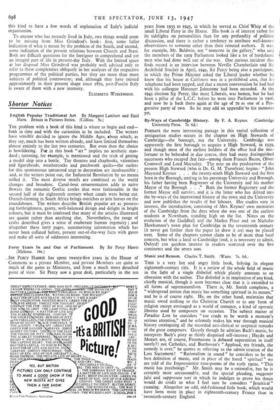Music and Reason. Charles T. 'Smith. (Watts. 7s. 6d.i THIS
is a very hot • and angry little book, belying its elegant eighteenth-century title. It is a review of the whole field of music in the light of ya single disbelief which plainly amounts to an obsession with the author. The disbelief is in inspiration of any kind, chiefly musical, though it soon becomes clear that it is extended to all forms of supernaturalism. There .is, Mr. Smith complains, a " widespread notion that music has something spiritual in its nature," and he is of course right. He, on the other hand, maintains that music owed nothing to the Christian Church or to any form of religion except envisaged as a world of romance, a kind of operatic libretto used by composers on occasion. The subject matter of Paradise Lost he considers " too crude to be worth a moment's serious attention," and he solemnly makes his way through musical history cataloguing all the recorded anti-clerical or sceptical remarks of the great composers. Greatly though he admires Bach's music, he interprets Bach's piety as thinly disguised self-interest ; Haydn and Mozart are, of course, Freemasons (a debased superstition in itself surely?) not Catholics, and Beethoven's " Applaud, my friends, the comedy is over," he quotes as referring to the admin'stration of the Last Sacrament ! "Rationalism in sound" he considers to be the best definition of music, and in place of the hated " spiritual " we are told of the Impressionist tone-poems of the early 19oos, " This music has psychology." Mr. Smith may be a rationalist, but he is certainly most unreasonable, and the special pleading, suggestio falsi and suppressio veri in which he indulges to prove his thesis would do credit to what I feel sure he considers " Jesuitical " cunning. Altogether an odd, old-fashioned little book, which would ave been more in place in eighteenth-century France than in CTS-18 twentieth-century England.


































 Previous page
Previous page